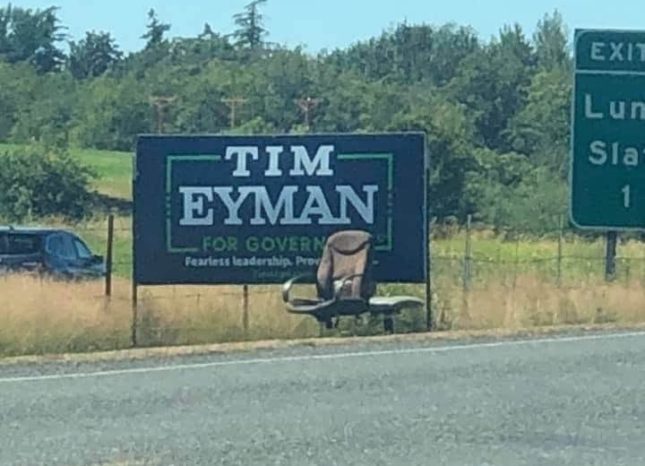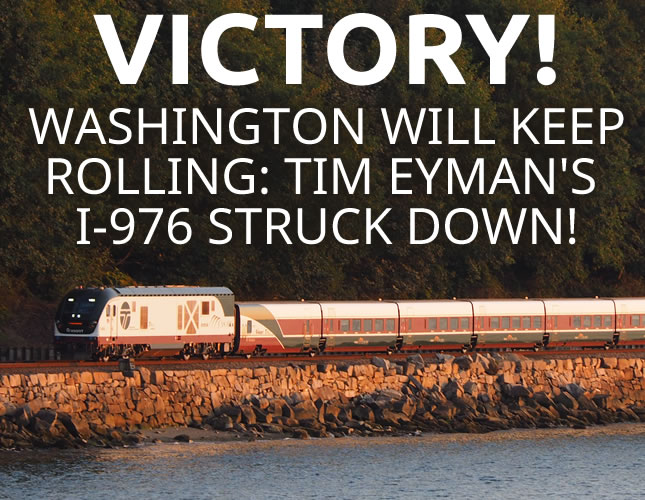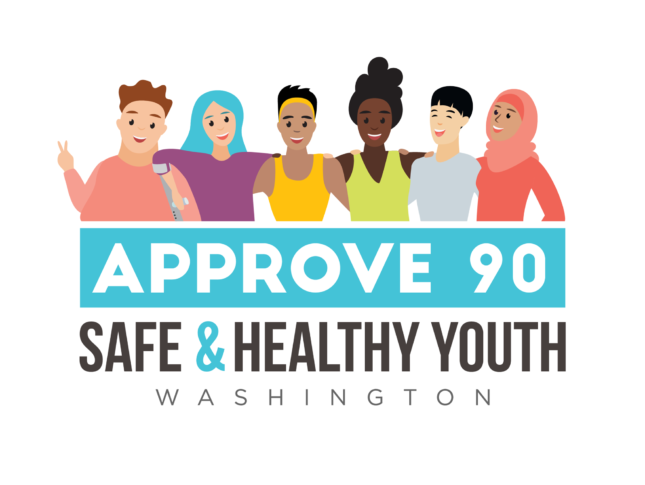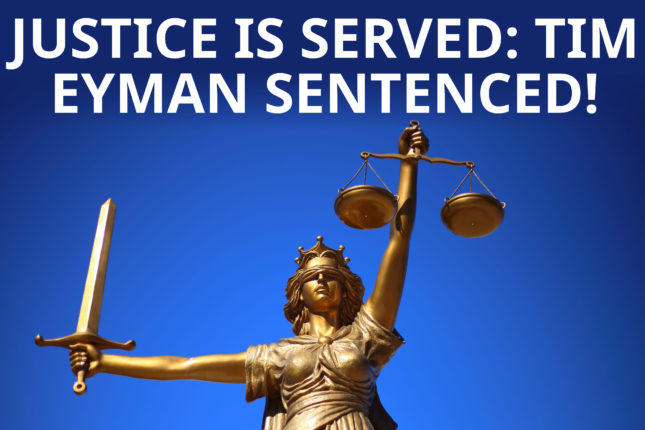Next week, elections officials in Washington’s thirty-nine counties will dispatch ballots in the 2022 midterm elections to over four million voters.
Unusually, there are no initiatives, referenda, or constitutional amendments on this year’s ballot, but there are two items labeled as “advisory votes,” numbered #39 and #40. These appear at the very top of the ballot, above the contests for U.S. Senate, Congress, Secretary of State, Legislature, and other offices, so voters will notice them immediately.
These items, which are anti-tax propaganda missives conceived by Tim Eyman and paid for at taxpayer expense, are described in the voter’s pamphlet as having been “Written by the Office of the Attorney General.”
However, this statement is not accurate.
The wording of the “advisory votes” actually comes from a statute (RCW 29A.72.283) that discredited initiative promoter Tim Eyman wrote in the mid-2000s which has yet to be either repealed or struck down as unconstitutional. All the Attorney General’s office does is fill in two blanks, with one consisting of a sentence fragment and the other a number (or the words “costing an amount that cannot currently be estimated”.)
The Q&A below goes into more detail about why this statement is in the voter’s pamphlet to begin with, and why it’s wrong.
Q: What are “advisory votes”?
A: At the local level, advisory votes are nonbinding plebiscites… essentially, a straw voting tool in which elected officials formally ask voters for an opinion on an issue, not at all unlike a poll. For example, a city’s leaders might ask voters if they support a fireworks ban prior to adopting such a ban councilmanically.
At the statewide level, “advisory votes” are anti-tax propaganda pieces masquerading as ballot measures. They are not unlike a script for the telemarketing technique known as push polling, in which people are given prejudicial and inflammatory information about somebody or something in the form of a question.
Discredited initiative promoter Tim Eyman conceived “advisory votes” to undermine public confidence and trust in the Washington State Legislature to advance his destructive anti-tax agenda.
Statewide, “advisory votes” are only triggered on bills that are determined to have had the effect of raising state revenue. No other kinds of bills ever get subjected to “advisory votes.”
Unlike with real ballot measures, there is no process for qualifying an “advisory vote” to the ballot through a citizen petition or legislative referral. Rather, the propaganda contained in “advisory votes” is automatically queued up and provided to elections officials following legislative passage of a revenue bill.
Note that if a bill only raises fees but not taxes, it’s not deemed a revenue bill under Eyman’s scheme.
Q: Where does the language that voters see on their ballots come from? Who wrote it?
A: The author is Tim Eyman. The wording in each and every “advisory vote” is specified by a statute Eyman wrote, with blanks that must be filled in each year by the Attorney General’s Office.
You can see the original language right here in the text of Initiative 960, which Eyman sponsored and which his former associates Mike and Jack Fagan cosponsored.
The relevant statutory language is as follows (with highlighting to show the blanks that must be filled in):
Within five days of receipt of a measure for an advisory vote of the people from the secretary of state under RCW 29A.72.040 the attorney general shall formulate a short description not exceeding thirty-three words and not subject to appeal, of each tax increase and shall transmit a certified copy of such short description meeting the requirements of this section to the secretary of state. The description must be formulated and displayed on the ballot substantially as follows:
“The legislature imposed, without a vote of the people, (identification of tax and description of increase), costing (most up-to-date ten-year cost projection, expressed in dollars and rounded to the nearest million) in its first ten years, for government spending. This tax increase should be:
| Repealed . . . . |
[ ] |
| Maintained . . . . |
[ ]” |
Saturdays, Sundays, and legal holidays are not counted in calculating the time limits in this section. The words “This tax increase should be: Repealed . . . [ ] Maintained . . . [ ]” are not counted in the thirty-three word limit for a short description under this section.
[ 2008 c 1 § 8 (Initiative Measure No. 960, approved November 6, 2007).]
As we can see, the wording formula for “advisory votes” is baked right into state law.
Notice also that the statute Eyman wrote does not provide for appeals of language. It does not provide for explanatory statements or pro and con statements either. Accordingly, the context that would always be provided for a real ballot measure is not included in the voter’s pamphlet and not available to voters.
Q: How does this differ from the process for developing language for initiatives and referenda?
A: Initiatives (proposed laws originating from a citizen petition) have ballot titles that are actually written by the Office of the Attorney General (AGO). Referenda (laws voted on by the Legislature referred to the people) have titles developed by the Legislature, AGO, or both.
When someone files an initiative and finalizes the text, that measure is sent to the AGO for development of a ballot title, and an attorney working for the people of the state is tasked with turning around a concise description and summary within five business days.
The “wrapper” for initiatives and referenda consists solely of factual fragments like “The legislature passed” and “Initiative Measure No. … concerns.” There are no prejudicial statements. The process is spelled out in RCW 29A.72.050:
(1) The ballot title for an initiative to the people, an initiative to the legislature, a referendum bill, or a referendum measure consists of: (a) A statement of the subject of the measure; (b) a concise description of the measure; and (c) a question in the form prescribed in this section for the ballot measure in question. The statement of the subject of a measure must be sufficiently broad to reflect the subject of the measure, sufficiently precise to give notice of the measure’s subject matter, and not exceed ten words. The concise description must contain no more than thirty words, be a true and impartial description of the measure’s essential contents, clearly identify the proposition to be voted on, and not, to the extent reasonably possible, create prejudice either for or against the measure.
(2) If a public investment impact disclosure is required under RCW 29A.72.027, the disclosure must appear in the middle of the ballot title, after the concise description and before the question. The disclosure is not, however, considered part of the ballot title and is not subject to any of the legal requirements for ballot titles under this chapter.
(3) For an initiative to the people, or for an initiative to the legislature for which the legislature has not proposed an alternative, the ballot title and public investment impact disclosure, if applicable, must be displayed on the ballot substantially as follows:
“Initiative Measure No. . . . concerns (statement of subject). This measure would (concise description). (Public investment impact disclosure, if applicable). Should this measure be enacted into law?
Yes . . . .□
No . . . .□”
(4) For an initiative to the legislature for which the legislature has proposed an alternative, the ballot title and public investment impact disclosure, if applicable, must be displayed on the ballot substantially as follows:
“Initiative Measure Nos. . . . and . . .B concern (statement of subject).
Initiative Measure No. . . . would (concise description). (Public investment impact disclosure, if applicable).
As an alternative, the legislature has proposed Initiative Measure No. . . .B, which would (concise description). (Public investment impact disclosure, if applicable).
1. Should either of these measures be enacted into law?
Yes . . . .□
No . . . .□
2. Regardless of whether you voted yes or no above, if one of these measures is enacted, which one should it be?
Measure No. . . . .□
or
Measure No. . . . .□”
(5) For a referendum bill submitted to the people by the legislature, the ballot issue and public investment impact disclosure, if applicable, must be displayed on the ballot substantially as follows:
“The legislature has passed . . . . Bill No. . . . concerning (statement of subject). This bill would (concise description). (Public investment impact disclosure, if applicable). Should this bill be:
Approved . . . .□
Rejected . . . .□”
(6) For a referendum measure by state voters on a bill the legislature has passed, the ballot issue and public investment impact disclosure, if applicable, must be displayed on the ballot substantially as follows:
“The legislature passed . . . Bill No. . . . concerning (statement of subject) and voters have filed a sufficient referendum petition on this bill. This bill would (concise description). (Public investment impact disclosure, if applicable). Should this bill be:
Approved . . . .□
Rejected . . . .□”
(7) The legislature may specify the statement of subject or concise description, or both, in a referendum bill that it refers to the people. The legislature may specify the concise description for an alternative it submits for an initiative to the legislature. If the legislature fails to specify these matters, the attorney general shall prepare the material that was not specified. The statement of subject and concise description as so provided must be included as part of the ballot title unless changed on appeal.
The attorney general shall specify the statement of subject and concise description for an initiative to the people, an initiative to the legislature, and a referendum measure. The statement of subject and concise description as so provided must be included as part of the ballot title unless changed on appeal.
Again, for real ballot measures, state law gives the AGO the responsibility to develop the language voters see, and the AGO is indeed the author as voters are typically told. But the statute governing “advisory votes” gives the AGO only a “fill in the blank” responsibility, not an authorship responsibility.
Q: Given RCW 29A.72.283, why does the voter’s pamphlet incorrectly attribute “advisory votes” as having been written by the AGO?
A: Presumably because attributing the real author (Eyman, who isn’t a state official) would be problematic.
The AGO is required by the law Eyman wrote to determine which bills need to get subjected to each year’s batch of anti-tax propaganda and then is required to fill in the blanks with fragments to complete Eyman’s formula. No other entity is involved in the preparation of “advisory votes,” so elections officials attribute the wording to the AGO.
But again, most of the wording is coming from statute and not from the AGO, unlike with real ballot measures.
Q: Why does this distinction matter? Why is it harmful to repeat a statement that the Secretary of State put in the voter’s pamphlet?
A: Misinformation research by our universities and centers of higher learning have shown that misinformation can have a corrosive and destructive influence on our politics and civic discourse.
The job of journalists is to seek truth and report it, and the truth about “advisory votes” is that they are propaganda items with a wording formula dictated by Initiative 960. They are not the work product of the AGO. Incorrectly repeating that they are gives them a false imprimatur of legitimacy.
It’s imperative for journalists to explain in their reporting that “advisory votes” were developed by Tim Eyman to serve his agenda of starving essential public services of revenue and aren’t real ballot measures.
“Advisory votes” employ prejudicial, inflammatory language and hyperbolic ten year cost projections to negatively influence people’s views of the work of the Washington State Legislature. They cannot be used to gauge people’s opinions about taxes because you can’t find out what people really think about an issue if you’re telling them what to think first.
Bad inputs will yield bad outputs every time.
Q: Can you go into greater detail regarding how the wording is prejudicial?
A: Yes, here’s a breakdown. Each piece of the formula is shown below with commentary:
- “The legislature imposed, without a vote of the people…” (It’s actually the Legislature’s job to make fiscal decisions on the people’s behalf.)
- “… costing $_____ (amount over ten years) … ” (Ten year cost estimates are deceptive, exaggerated, and misleading; budgeting isn’t done in ten year increments. Any number sounds more impressive when you take it out over ten years.)
- “… for government spending.” (When the Legislature raises revenue, there’s always a reason or a purpose for its action; for example, the new state capital gains tax funds the Education Legacy Trust and the Move Ahead Washington package provides grants so youth ages eighteen and under can ride fare-free.)
- Then there are two responses: “Repealed” and “Maintained”. “Repealed” is shown first, because that’s the oval Eyman wants voters to fill in. “Maintained” (which is also weak, nonstandard verbiage) is shown second. Ordinarily, “Yes” or “Approved” is shown first, and “No” or “Rejected” is shown second for a ballot measure. If you’ve covered politics for any length of time, then you’re familiar with this dichotomy. Since Eyman’s goal with “advisory votes” is to influence how people think instead of measuring public opinion, he flipped the standard dichotomy on its head, all to serve his agenda of using propaganda to generate even more propaganda for attacks on our elected representatives.
Q: How should people respond to “advisory votes”?
A: The Northwest Progressive Institute, which is leading the effort in Washington to permanently abolish statewide “advisory votes,” urges all Washingtonians to vote “Maintained” on every “advisory vote” rather than skipping over these items.
As stated, since “advisory votes” employ prejudicial and inflammatory language, they can’t be used as a means of measuring public opinion. Regardless of how a voter feels about a bill subjected to an “advisory vote,” they should vote “Maintained” to convey their opposition to having their ballots polluted with anti-tax propaganda that does not belong there.
Eyman has rigged “advisory votes” to try to get people to either vote “Repealed” or skip them in disgust; voting “Maintained” is what he definitely doesn’t want people to do. Every voter who wants to take a stand for sensible ballots, voting justice, and access to democracy should confidently vote “Maintained” and then move on to the rest of the ballot.
For further information, visit VoteMaintained.org.

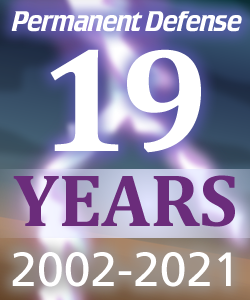 These and other wins have kept intact hard-won progress on a number of issues, from multimodal transportation funding to improved school curricula to meaningful enforcement of the Fair Campaign Practices Act.
These and other wins have kept intact hard-won progress on a number of issues, from multimodal transportation funding to improved school curricula to meaningful enforcement of the Fair Campaign Practices Act.